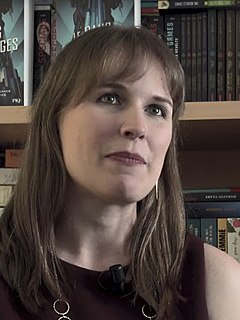A Quote by Haruki Murakami
But if you peeled away the ornamental egos that she had built, there was only an abyss of nothingness and the intense thirst that came with it.
Related Quotes
As if to build a fence around the fatal emptiness inside her, she had to create a sunny person that she became. But if you peeled away the ornamental egos that she had built, there was only an abbys of nothingness and the intense thirst that came with it. Though she tried to forget it, the nothingness would visit her periodically - on a lonely rainy afternoon, or at dawn when she woke up from a nightmare. What she needed at such times was to be held by someone, anyone.
Was it all in my head? A Lunar trick?” Her stomach twisted. “No.” She shook her head, fervently. How to explain that she hadn’t had the gift before? That she couldn’t have used it against him? “I would never lie—” The words faded. She had lied. Everything he knew about her had been a lie. “I’m so sorry,” she finished, the words falling lamely in the open air. Kai peeled his eyes away, finding some place of resignation off in the glistening garden. “You’re even more painful to look at than she is.
She would always feel this wild girl was the truest of any of the people she had already been: adored daughter, bourgeois priss, rebel, runaway, dope-fiend San Francisco hippie; or all the people she would later be: mother, nurse, religious fanatic, prematurely old woman. Vivienne was a human onion, and when I came home at twenty eight years old on the day the monster died, I was afraid that the Baptist freak she had peeled down to was her true, acrid, tear-inducing core.
Margaret had always dreaded lest her courage should fail her in any emergency, and she should be proved to be, what she dreaded lest she was--a coward. But now, in this real great time of reasonable fear and nearness of terror, she forgot herself, and felt only an intense sympathy--intense to painfulness--in the interests of the moment.
You had every right to be. He raised his eyes to look at her and she was suddenly and strangely reminded of being four years old at the beach, crying when the wind came up and blew away the castle she had made. Her mother had told her she could make another one if she liked, but it hadn't stopped her crying because what she had thought was permanent was not permanent after all, but only made out of sand that vanished at the touch of wind and water.
She was a triumph over ugliness, so often more beguiling than real beauty, if only because it contains paradox. In this case, as opposed to the scrupulous method of good taste and scientific grooming, the trick had been worked by exaggerating defects; she'd made them ornamental by admitting them boldly.
The only struggle came from me wanting more for my family and feeling like if they had one less individual to take care of - if my mom only had her and my sister and my grandmother and my aunt to take care of, couldn't she do the things she was doing for me for herself? That's the reason I took myself away from my family. I left home when I was 13 years old to assume the responsibilities of being a man.
Ultimately, Leibniz argued, there are only two absolutely simple concepts, God and Nothingness. From these, all other concepts may be constructed, the world, and everything within it, arising from some primordial argument between the deity and nothing whatsoever. And then, by some inscrutable incandescent insight, Leibniz came to see that what is crucial in what he had written is the alternation between God and Nothingness. And for this, the numbers 0 and 1 suffice.
She also considered very seriously what she would look like in a little cottage in the middle of the forest, dressed in a melancholy gray and holding communion only with the birds and trees; a life of retirement away from the vain world; a life into which no man came. It had its attractions, but she decided that gray did not suit her.
At that moment a very good thing was happening to her. Four good things had happened to her, in fact, since she came to Misselthwaite Manor. She had felt as if she had understood a robin and that he had understood her; she had run in the wind until her blood had grown warm; she had been healthily hungry for the first time in her life; and she had found out what it was to be sorry for someone.
She smiled. She knew she was dying. But it did not matter any longer. She had known something which no human words could ever tell and she knew it now. She had been awaiting it and she felt it, as if it had been, as if she had lived it. Life had been, if only because she had known it could be, and she felt it now as a hymn without sound, deep under the little whole that dripped red drops into the snow, deeper than that from which the red drops came. A moment or an eternity- did it matter? Life, undefeated, existed and could exist. She smiled, her last smile, to so much that had been possible.



































